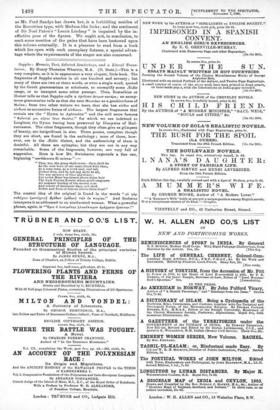Sappho : Memoir, Text, Selected Renderings, and a Literal Trans.
lotion. By Henry Thornton Wharton, M.A. (D. Stott.)—This is a very complete, as it is in appearance a very elegant, little book. The fragments of Sappho number in all one hundred and seventy ; but many of these are two or three words, or even a single word, quoted by the Greek grammarians or scholiasts, to exemplify some .zEolic usage, or to interpret some other passage. Thus, Eustathius or Homer tells ns that Sappho calls a cyclone Ji;.' _Yep.oY KIST 471 ; an anony- mous grammarian tells us that she uses MourrcLum as a genitive form of Moira; from two other writers we learn that she has Kly3uv and KlyStiva as accusative forms of abbuyos. The largest fragments that remain are the " Hymn to Aphrodite" and the still more famous " 4miverai ,uot fawns free 0 foicriy," for which we are indebted to Longinus, the Hymn having been preserved by Dionysins of Hali- carnassus. The other fragments, though they often give us glimpses of beauty, are insignificant in size. Three poems, complete though they are short, are found in the anthology ; none of them, how- ever, are in the lEolie dialect, and the authenticity of them is doubtful. All three are epitaphs; but they are not in any way remarkable. Some of the fragments, however, are very full of suggestion. Here is how Mr. Swinburne expounds a fine one, beginning " KcerOcf.moucra Si xelcrfat":—
" Thee, too, the grass shall cover : thou shalt be As the rose born of one same blood with thee, As a song sung, as a word said, and tall Flower-wise, and be not any more at all, Nor any memory of thee anywhere ; For never Muse has bound above thine hair The high Pierian flowers whose graft outgrows All summer kinship of the mortal rose And colour of deciduous dale, nor shed Reflex and flush of heaven above thine head."
The central idea of the original is found in the words " ov yap era EXE IS (1.4€74XelS) 13Facer (Wow) Taw EIC wtepins." And Stobteus interprets it as addressed to an uneducated woman. What a powerful phrase, again, is "'Epos b Taw- tp.A.ns 7Avkinritepoy iyaxavov 6preTov!"














































 Previous page
Previous page